India is blessed with many herbs and spices but many a times, we don’t really give them their due. One such indigenous ingredient is Sabja Seeds or Sweet Basil Seeds. Also, popular as Falooda Seeds in India, as it is one of the main ingredients in the dessert-drink Falooda. Sabja Seeds are one of the underestimated ingredients in Indian cooking. Although, because of its innumerable health benefits, it is in limelight today. Still, not many people use it. In this post, I have shared some tips, tricks on how to use and benefits of these super seeds. Knowing these, I’m sure you’ll also start consuming them more often.
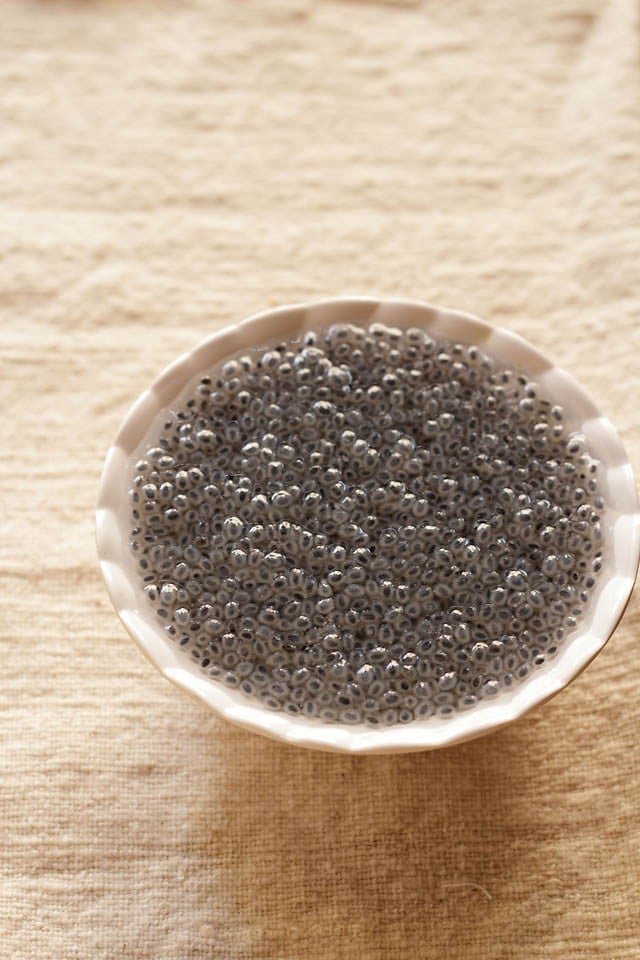
Table of Contents
About Sabja Seeds
Just as both flax seeds and chia seeds were trending a few years back, the present day is the time for our very own Sabja Seeds. These seeds are also known as sweet basil seeds in English and are quite distinct in nature, when compared to the similar looking chia seeds.
Keep in mind that chia seeds are totally different than sabja seeds. In India, sabja is popular amongst people because of the popular dish falooda.
Like I mentioned in the beginning, other local Indian names of Sabja Seeds include Falooda Seeds and Tukmaria as well.
These are basically the nutrient-rich seeds of the sweet basil plant. In addition to being used in falooda, Sabja Seeds are also commonly used in various other sharbats and Milkshakes.
Although these sweet basil seeds do not have a taste of their own and are quite bland, they impart a good texture to a dish and make it nutritious too.
Some other refreshing and cooling Indian summer beverages like Jigarthanda, Shikanji (Nimbu Pani), Rooh Afza, Nannari Syrup, etc. also have Sabja Seeds added in them.
In this post, I have demonstrated the easiest and simplest way on how to use Sabja Seeds. Basically, you just have to soak the cleaned seeds in water, for about 20 to 30 minutes.
Due to the nature of these seeds, they become translucent and develop a gelatin-like coating around them after absorbing the water. You can strain and then use it in your coolers, beverages, mocktails, sharbet, ice creams, kulfi, falooda, etc.
Sabja Seeds Benefits
These tear-drop shaped Sabja Seeds or sweet basil seeds, which resemble chia seeds, have an impressive benefits list. Some of them are:
- Sabja Seeds are rich sources of iron, calcium and magnesium; thus, promote better muscle activity, bone health and blood cell production.
- There are enough and more references made to how important our daily intake of dietary fibre is. For the same reason, you might just want to include Sabja Seeds in your diet as they are brimming with soluble fibre. Helps in keeping you full for longer, bettering bowel movements and avoiding constipation.
- Since sweet basil seeds are consumed after soaking in water, due to which, they swell up forming a gel-like covering. This helps to bulk-up the food in stomach, which further leads to slower absorption. This might be beneficial to people with type-2 diabetes, as the sugar levels rise slower avoiding sudden post-meal rise in blood sugars.
- These seeds are good sources of essential Omega-3 acids, have anti-inflammatory and anti-cancer properties, and good for the heart too.
- Sabja Seeds are good for sore throats, respiratory disorders, colds, aids digestion, has a calming effect on the body and can uplift your mood.
Side Effects Of Basil Seeds
Inspite of the various health benefits of Basil Seeds, you still need to keep a check on its consumption as it may not suit your body requirements. You may be allergic to it. In that case too, you must avoid it.
Also, do watch out for some unwanted effects, such as bloating. If you happen to be on a blood-thinning medication, then avoid these seeds. As they have Vitamin K in them, which promotes blood clotting.
Like mentioned earlier, these seeds swell up forming a jelly-like soft bulk. Unfortunately, this renders it unsafe for babies and young children, potentially leading to choking, as also for those with swallowing difficulties.
As a rule, work on your food intake based on your nutritionist’s advice. Be careful, especially if you have health conditions or take any medications, whether short or long term.
How to Prep Basil Seeds
1. Take sweet basil seeds or Sabja Seeds in a bowl. Pick up the chaff, husks or stones if there are any, from them.
You could use any amount of these sweet basil seeds. Here in the below photo, I have taken ½ tablespoon of these tiny seeds in a bowl.
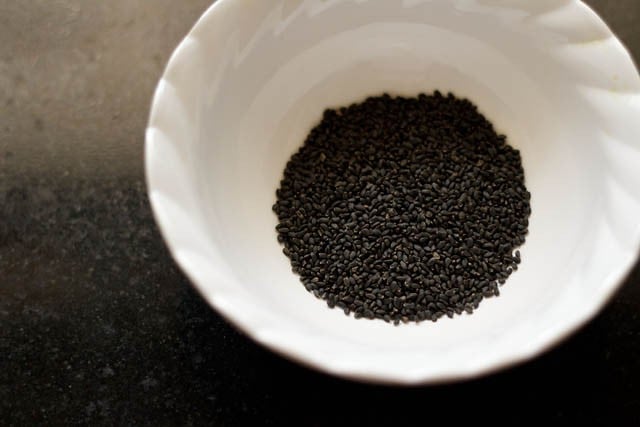
2. Pour about ¾ to 1 cup of water.
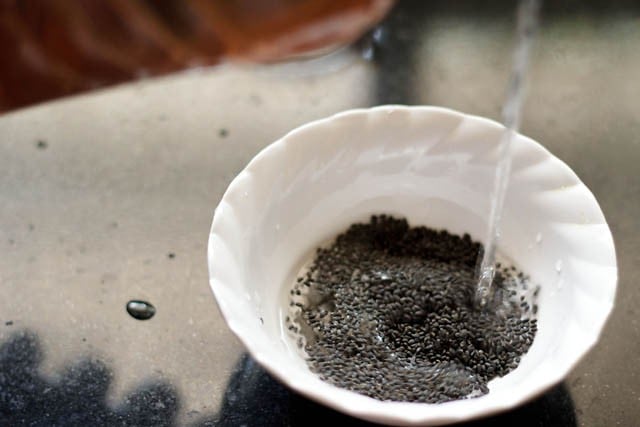
3. The seeds will soon begin absorbing water.
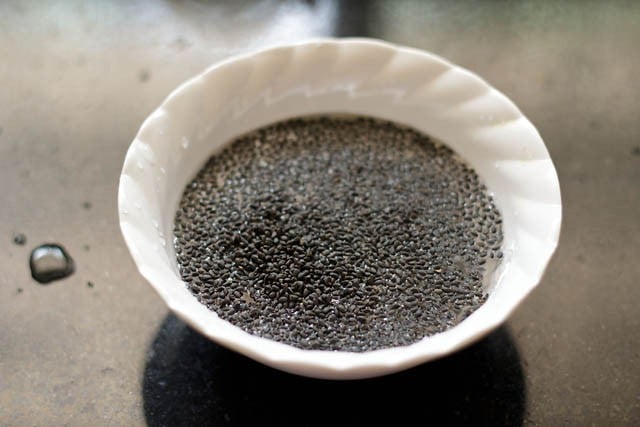
4. These are the basil seeds just after 2 minutes of adding water.
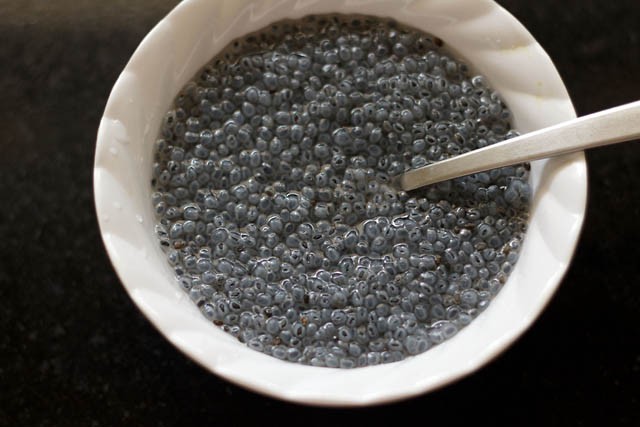
5. Soak them for 20 to 30 minutes. Once they absorb the water, a translucent gelatin like coating is formed around them.
Strain and then use these soaked seeds in drinks, coolers, sherbets, ice creams, falooda or kulfis.
Remember to add enough water. Otherwise the soaked seeds become lumpy when they start swelling.
They only absorb water as much as they required. So, you can always add extra water to avoid the lumps being formed.
Refrigerate any leftover soaked basil seeds and these keep well for 1 to 2 days.
Reference Links:
https://www.healthline.com/
https://www.medicalnewstoday.com/
Please be sure to rate the recipe in the recipe card or leave a comment below if you have made it. For more vegetarian inspirations, Sign Up for my emails or follow me on Instagram, Youtube, Facebook, Pinterest or Twitter.
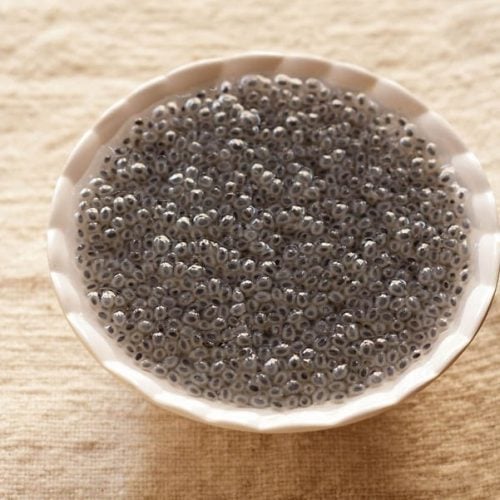
Sabja Seeds | How to Prep Basil Seeds
Ingredients
- ½ tablespoon sabja seeds or as required (sweet basil seeds or falooda seeds or tukmaria)
- ¾ to 1 cup water – to soak
Instructions
- Take the sweet basil seeds in a bowl. Pick up the chaff or husks or stones if there are any from them.
- If you prefer you can rinse them in a small fine strainer.
- Pour water. remember to add enough water. Otherwise the soaked seeds become lumpy when they start swelling. They only absorb water as much as they required. So you can always add extra water to avoid the lumps being formed.
- The basil seeds will soon begin absorbing water.
- Soak them for 20 to 30 minutes. Once they absorb the water, a translucent gelatin like coating is formed around them.
- Strain and then use these soaked basil seeds in drinks, coolers, sherbets, ice creams, falooda or kulfi.
- Refrigerate any leftover soaked sabja seeds in the refrigerator for 1 to 2 days.
Nutrition Info (Approximate Values)
This Sabja Seeds post from the archives, first published in May 2013 has been republished and updated on December 2022.
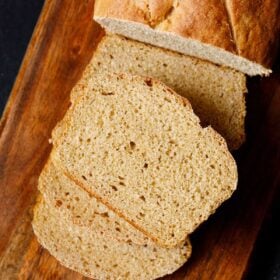
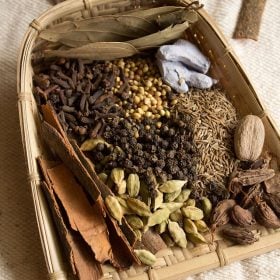
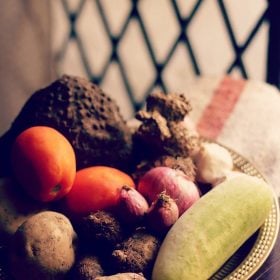
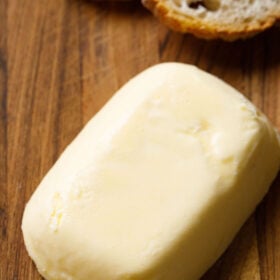








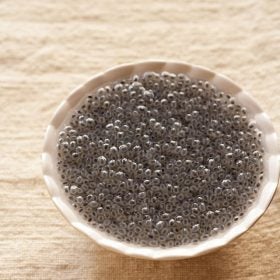
Hi
Can you grind basil seeds and use them as thickeners to make jam? Thank you.
I am not sure how the ground basil seeds will behave when you cook them. This method needs to be tested first with a small portion of jam.
Is tulsi seeds and Sabja seeds same thing. Shop keeper gave me Tulsi seeds when asked Sabja seeds.
Regards
Ajay
tulsi seeds are different and sabja seeda are different. both tulsi and basil are from the same plant family. tulsi is called as holy basil and sabja is sweet basil. italian basil is also from the same plant family. hope this helps.
Could you kindly tell me where i can sabja seeds please ? Thanks
you can easily buy them in any grocery shop if you live in mumbai or pune. also available in super stores. or else you can buy them online on amazon.in
I have an farm of sabja/basil seeds if any one want contact me 9960921270.
Mr Dasna Thanks for Sabja Seed Recipe But I want to know how much an Adult. can use Sabja Seed in one day how many spoon we should soke and eating time can I use it empty stomach or after any meal when I use after sokeing in mixy tiny black Seeds shown in the mixture. That black tiny Seeds should be eaten with the shake
Thanks Shravan. I use 1 teaspoon everyday. But i am not a nutrition expert. so can’t say much about it.
Read all columns.the use of sabja seeds is highly assential for a family.
Hello ,Where would I be able to find sabja seeds.
in india, you can easily get them in local grocery stores and even in supermarkets. if you live outside india, then you can buy them online on amazon.com
Hello
I see that most sabja recipes are cold drinks.
Can it be consumed with hot meals, such as Oatmeal? Is there any downside of consuming it hot, instead of cold?
Thank you
thats true. even i have never seen sabja being served hot or in hot meals. i do not know if consuming sabja hot has any side effects.
What is the Malayalam name for Basilseeds.
not sure about malayalam, but sweet basil is called as thiruneetru pachai in tamil.
Sabja seeds are called kamakasturi seeds in Karnataka .
Soak 1/4 tea spoon of sabja seeds in a glass of water for an hour then add 2 tea spoons of sugar in it and drink.
It keeps body cool in summer. It protects us from heat waves.
thanks for the name of sabja in kannada langugage. also thanks for the suggestion to make this cooling sabja drink for summers.
i m trying to eat healthy as i have pcod .the more processed foods i avoid and the sugar the more healthy i become .also fat .the less % of fat in my body the better.
if you have time could you tell me
1.chia seeds are called in hindi.
2.flaxseeds are called in hindi.
also have ever tried stevia .
thats a nice and healthy habit akansha. i don’t know what are chia seeds called in hindi. we get here but expensive as imported from outside india. flaxseeds are called alsi in hindi. i have tried stevia powder. but i did not like its taste. it wasa different kind of sweetness which did not suit my palette.
Chia seeds are called Sabja and Flax seeds are called Alsi in Hindi
chia seeds are not sabja seeds. both are different. flax seeds are called as alsi in hindi.
Chia seed in Hindi name is (bapchi)
Flax seed name ( alsee)
Are basil seeds used as a spice? If so, could you tell me how I may use them? Thank you.
megan, basil seeds are not used as a spice. they are just added to drinks and in falooda. you can also add them to fruit salads.
Chia seed use with milk, juices,ice creams
I read yor page and ilike it very mutch u give me very usefull knowlidge thank you very mutch.
welcome habib
we are having basil seeds/subja seed
I need Sabja Seed and Chia Seed if you have both please let me know the prices.
yatin, we are not into selling cooking ingredients.
i do not get it easily please tell me its indigenous name or the name how the locals. call it here in uttar pradesh
these are generally called as sabza or sabja seeds in hindi. the other name is tukmaria seeds. i don’t know what these are called locally in uttar pradesh.
You get them at Natures Basket. If you have a Godrej Natures Basket in the vicinity, the stock them. At least in Mumbai, so you can even ask them to get it for you on a regular basis. Hope that helps.
Jaisinh
thanks for the reply.
In north India, it is known as Tukmalanga!!
Tukmalanga is different than tukmaria check with sell of herbs.
Where do I get Sabja or basil seeds
you will get basil seeds in any good super store section where spices are kept or might even get them in the shops which sells dry fruits.